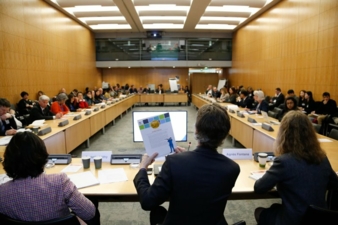17/02/2021 – Key resources for a responsible supply chain — auf Deutsch lesen
OECD: Sector significant
Yvonne Heinen-Foudeh reports from this year's OECD virtual apparel forum for textile network.
The apparel industry is one of the largest consumer goods sectors in the world. And has a CO2 footprint that is far too large. What is to be done now? The Organisation for Economic Development and Cooperation (OECD) has been able to carve out a place for itself on the world stage in the wake of the increasing number of problems that only need to be addressed globally. Today, there is hardly an issue of international relevance without OECD reports and regulations. With a complete package of measures for the implementation of responsible apparel supply chains, their evaluation, feasibility studies, and communication platforms – in short, key tools – are available to the branch. Solution approaches and, above all, coordination opportunities for a complex challenge that are worth taking advantage of.
The guiding principle of ecological, economic and social sustainability increasingly determines policy – nationally, at EU level and globally. Necessary developments that also and above all affect apparel.
The processes of adapting entrepreneurial action to the needs of the planet – of the people who produce fashion and of those who consume it – are complex and demanding.
Transparency and cooperation are key tools on the way to a sustainable development.
A critical first step: the 2017 OECD Guidelines, prepared in close collaboration with experts and with the participation of industry delegates. Crucial directional initial point: the OECD Due Diligence Guidance for Responsible Supply Chains in the Garment and Footwear Sector, adopted in 2017, establishes a common understanding of due diligence in the sector to help companies meet the due diligence expectations laid out in the OECD Guidelines for Multinational Enterprises.
Crucial aspects
Regarding the crucial aspects of transparency and cooperation between all market partners and stakeholders involved, as well as usable = traceable data, the OECD work is applying the lever at pivotal points: With a view to the crucial aspect of transparency, to usable = traceable data, the OECD work applies the lever at crucial points: Having long since escaped the academic ivory tower of the founding years, one has recently launched a process to assess the alignment of multi-stakeholder and industry initiatives with the detailed recommendations of the OECD Due Diligence Guidance for Responsible Supply Chains in the Garment and Footwear Sector. This OECD Alignment Process along with its assessments as essential outcome appears to be voluntary.
In addition, the organization, which was launched in 1961 and is also committed to combating child labor, social injustice and inequality of wealth distribution, the refugee issue and many other facets of sustainable business and politics, can demonstrate results for the sector: The OECD Pilot Project on Due Diligence in Public Procurement of Apparel and Textiles is helping buyers here integrate the OECD's risk-based due diligence approach to public procurement of apparel and textiles.
Harmonization under the EU Framework
The pilot project, which was launched during the past OECD Forum from February 1–5, is taking place under the Responsible Business Conduct and Public Procurement program and is expected to last until December 2021.
The annual event, held online this year, brings together more than 600 representatives from governments, companies, unions and civil society to address emerging risks and share insights on the implementation of labor, human rights, environmental and integrity due diligence in global apparel supply chains. Arguably a unique forum, Tyler Gillard, Manager at the RBC (Responsible Business Conduct) Centre aptly describes it as, “the only place where everybody can get together and address the diversified issues involved”. And that on a global basis and with immense expertise, we want to admit at the end of the last day.
And what has been achieved to date?
“Some three years after the adoption of the Guiding Principles, stakeholders are generating increasingly valid data on how implementation is evolving and maturing”; as the OECD puts it. The recently published feasibility study offers an overview of various strategies and many other helpful suggestions for the quick reader and those who look right away into the future topic in depth.
Apparel represents one of the largest consumer goods sectors in the world. And one with a far too large carbon footprint, track records as an employer and supporter of social and ethical standards which gives rise to a wide range of criticism. And precisely because of the segment‘s role as an important economic driving force the implementation, monitoring and compliance of responsible supply chains is paramount.
Yvonne Heinen-Foudeh




